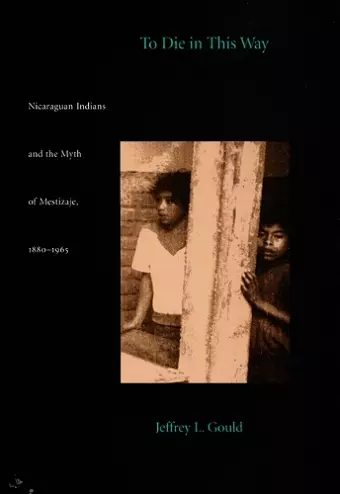To Die in this Way
Nicaraguan Indians and the Myth of Mestizaje, 1880-1965
Format:Hardback
Publisher:Duke University Press
Published:7th Jul '98
Currently unavailable, and unfortunately no date known when it will be back

Challenging the widely held belief that Nicaragua has been ethnically homogeneous since the nineteenth century, To Die in This Way reveals the continued existence and importance of an officially “forgotten” indigenous culture. Jeffrey L. Gould argues that mestizaje—a cultural homogeneity that has been hailed as a cornerstone of Nicaraguan national identity—involved a decades-long process of myth building.
Through interviews with indigenous peoples and records of the elite discourse that suppressed the expression of cultural differences and rationalized the destruction of Indian communities, Gould tells a story of cultural loss. Land expropriation and coerced labor led to cultural alienation that shamed the indigenous population into shedding their language, religion, and dress. Beginning with the 1870s, Gould historicizes the forces that prompted a collective movement away from a strong identification with indigenous cultural heritage to an “acceptance” of a national mixed-race identity.
By recovering a significant part of Nicaraguan history that has been excised from the national memory, To Die in This Way critiques the enterprise of third world nation-building and thus marks an important step in the study of Latin American culture and history that will also interest anthropologists and students of social and cultural historians.
“[A] remarkable example of where ethnographic history is moving. . . . [A] cogent, lively, and highly accessible interpretation of identity as contingent and historically situated. Gould also provides a nuanced history of memory, demonstrating how rich and insightful ethnographic studies of memory would be if researchers were to situate them in long-range temporal processes while paying close attention to chronology.” - Joanne Rappaport, American Ethnologist
“To Die in This Way is a brilliant work of integrative scholarship. . . . [P]owerful political, economic, and cultural analysis. . . .” - Greg Grandin, Hispanic American Historical Review
“For anthropologists there are at least two important aspects of this book written by an historian of Central America. First, and most obvious, it is clearly interdisciplinary. Even more important, Gould has used our beloved ‘fieldwork,’ our distinctive method of obtaining data.” - Thomas Maloney, American Anthropologist
“The questions Gould’s admirable work raises should spur in-depth scholarship in Nicaragua and elsewhere. The book has appeal, too, for a broad audience. . . . Gould illustrates how discourses of homogeneity and equal rights can be used as weapons, and thus touches on issues of assimilation such as bilingual education, religious freedom and nationalism, and on the thorny issues concerning reparations for intergroup oppression, such as affirmative action and rectification of borders.” - Times Literary Supplement
“To Die in This Way is an extraordinary achievement. The research required to sustain such an innovative and original argument is truly impressive, ranging from searches through political and legal archives to ethnography and oral history. In short, this is a pathbreaking major work in Latin American history."—John Coatsworth, Harvard University
“Delving into Nicaragua’s myth of mestizaje, Gould provides a powerful analysis of the political and cultural mechanisms that eradicated indigenous identity throughout Latin America. His careful analysis of indigenous cultural loss, unlike that of others, does not require an essentialist reading of indigenous culture.”—Carol Smith, University of California at Davis
“Twenty years from now To Die in This Way will still be read as a classic work heralding (one can only hope) a wave of studies deconstructing ethnic identity and nationalism throughout modern Central America.”—Lowell Gudmundson, Mount Holyoke College
“To Die in This Way is a brilliant work of integrative scholarship. . . . [P]owerful political, economic, and cultural analysis. . . .” -- Greg Grandin * Hispanic American Historical Review *
“[A] remarkable example of where ethnographic history is moving. . . . [A] cogent, lively, and highly accessible interpretation of identity as contingent and historically situated. Gould also provides a nuanced history of memory, demonstrating how rich and insightful ethnographic studies of memory would be if researchers were to situate them in long-range temporal processes while paying close attention to chronology.” -- Joanne Rappaport * American Ethnologist *
“For anthropologists there are at least two important aspects of this book written by an historian of Central America. First, and most obvious, it is clearly interdisciplinary. Even more important, Gould has used our beloved ‘fieldwork,’ our distinctive method of obtaining data.” -- Thomas Maloney * American Anthropologist *
“The questions Gould’s admirable work raises should spur in-depth scholarship in Nicaragua and elsewhere. The book has appeal, too, for a broad audience. . . . Gould illustrates how discourses of homogeneity and equal rights can be used as weapons, and thus touches on issues of assimilation such as bilingual education, religious freedom and nationalism, and on the thorny issues concerning reparations for intergroup oppression, such as affirmative action and rectification of borders.” * TLS *
ISBN: 9780822320845
Dimensions: unknown
Weight: 807g
336 pages